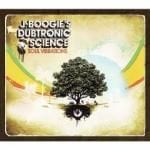
San Francisco-based DJ/producer J Boogie has offered his first slice of Bay Area groove since his widely praised 2003 self-titled debut LP. This is not to say that J Boogie hasn’t been busying himself with mixing, cutting, and turn-tabling in the interim. Surely he can’t be sitting on his hands and still be the best: his radio show Beat Sauce boasts accolades including “Best Hip-Hop Radio Show” by the San Francisco Guardian, while his many crowning achievements include “San Francisco’s Best Radio and Club DJ”. Aside from hectic DJ and touring obligations, Boogie also spent the intervening years beefing up the catalogue of San Francisco-based, funky-grooves powerhouse Om Records with mixes and compilations.
Soul Vibrations — an admittedly banal title for what it is — once again showcases Boogie’s indefatigable innovations on the production front. With the help of a new Dubtronic Science crew of woodwind/brass players and percussionists, the album is an arty blend of live instrumentation, sunny Amp Fiddler-esque electronic grooves, sonic odds and ends, as well as heavyweight vocals and emceeing. Though it is more club than the dub of his debut, the album runs the gamut of groove — funk, soul, dub, afro-beat, Latin — without ever sounding dilettantish. After all, genre-bending is pretty much the only game in town nowadays, so to stand out is to play it like an ace.
And as fans can expect, Soul Vibrations harnesses J Boogie’s expansive web of connections within the great subterranean depths of dance music making. Soul boosters featured include reggae doyen Tony Moses, Brooklyn MC Ohmega Watts, Philly soul DJ Rich Medina and singer-of-many-stripes Jennifer Johns. (Just the coordination of the line-up would go some way toward explaining the delay of this release.)
Soul Vibrations is no frivolous club soundtrack that one dances to but never savours. It’s as much a colourful patchwork of genres as it is a multicultural exploration that’s replete with emotional ups-and-downs. To wit: the listener is fed the merriment of party life with “Inferno”, followed by a forlorn lament against the oppressive world order on “Same Ol’ Thang”. “Que Pasa” then hits the listener with a first-person account of the sorry plight of an ethnic minority in the Promised Land. In other words, it’s all very California.
The album opens with “Sweet Music”, featuring diaphanous female vocals chanting “Don’t blow your heart / Play sweet music” as its leitmotif. A laconic Tony Moses goads J Boogie to “make sweet music”, his deep but drowsy register a counterpoint to the light tapestry of reverb-drenched stringy inserts, high frequency wails, processed brass hooks, and aeronaut sound effects that makes the song so unforgettably surreal.
Notable tracks include “Leave It All Behind”, a trippy dub number that has spoken word artist Aima the Dreamer appealing for inner peace while Los Angeles jazz septet the Rebirth provides colour in the form of snappy brass sequences. Another high note is the finger-snapping “14U”, in which Ohmega Watts and partner-in-rhyme Ragen Fykes rhapsodise about love and escape over a saccharine Auto-Tune swoon and triumphant trumpet tooting.
Balmy morsels aside, Soul Vibrations is strongest where it reveals some conscious roots. “Que Pasa” has Nicaraguan-American rapper Deuce Eclipse lamenting in first person the typical Latino immigrant’s condition. Lyrics such as “My people working in this country take away your stress, yes?” are especially poignant. “Revolution”, featuring Lyrics Born and the Mamaz, is a lumbering reggae-inspired, fuzz-bass-driven statement in subverting the running order of grotty urban life. The song’s haunting trumpet motif, distorted harmonies, and oddball celestial sound effects certainly cannot be appreciated fully in a club. Like much of the rest of the album, come to think of it.

![Call for Papers: All Things Reconsidered [MUSIC] May-August 2024](https://www.popmatters.com/wp-content/uploads/2024/04/all-things-reconsidered-call-music-may-2024-720x380.jpg)



